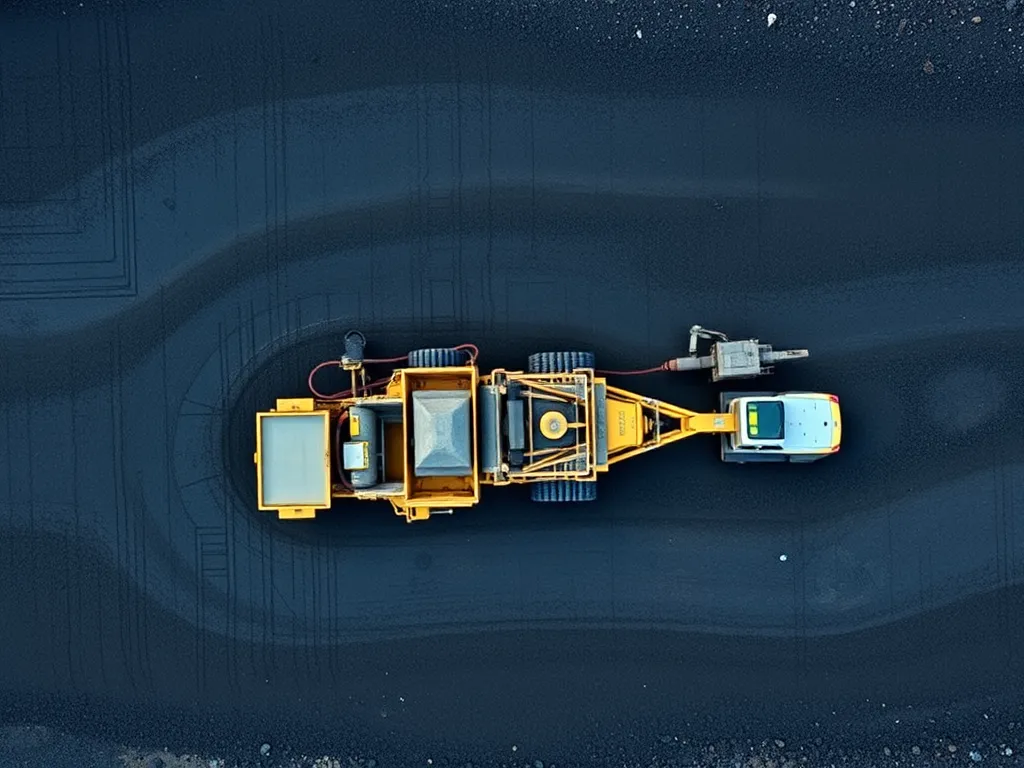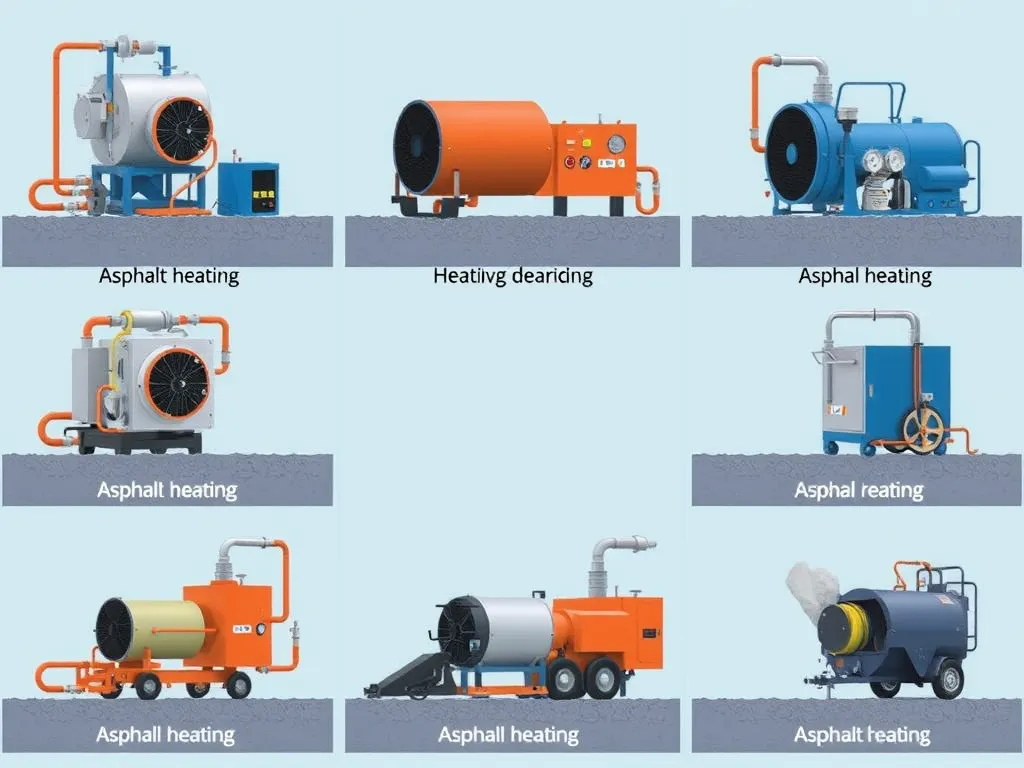Asphalt Alternatives for Businesses: Sustainable and Cost-effective Solutions
Published on: June 8, 2025 | Last Updated: April 14, 2025
Written By: George Voss
Asphalt alternatives for businesses are eco-friendly paving materials designed to replace traditional asphalt. These options—including concrete, permeable pavers, gravel, recycled asphalt, and resin-bound surfaces—provide similar durability with lower environmental impact. Gravel costs $1.50-$3.00 per square foot installed, up to 70% cheaper than asphalt. Permeable pavers reduce stormwater runoff by 50-70%, while recycled asphalt slashes material costs by 20-40%. Businesses gain durable surfaces that meet EPA stormwater standards and cut long-term maintenance by 30-50%.
This article explores commercial-grade alternatives to asphalt, comparing costs, lifespans, and eco-benefits. Learn why permeable pavers cost $8-$15 per square foot but last 25+ years with minimal upkeep. See how resin-bound surfaces prevent cracks or how recycled rubber asphalt handles heavy traffic. Get data on installation timelines, maintenance savings, and design options to match your business needs.
Contents
- Understanding Asphalt Alternatives for Commercial Use
- Common Asphalt Alternatives for Commercial Properties
- Evaluating Cost-effective Asphalt Alternatives
- Installation and Maintenance Of Asphalt Alternatives
- Aesthetic Enhancements With Asphalt Alternatives
- Environmental Benefits Of Sustainable Asphalt Alternatives
- Frequently Asked Questions About Asphalt Alternatives
- Closing Thoughts
- Additional Resources for You:
Understanding Asphalt Alternatives for Commercial Use
Businesses seeking eco-friendly surfaces for commercial properties now have multiple asphalt substitutes. These materials balance durability with environmental goals while meeting traffic demands.
What Are Asphalt Alternatives?
Asphalt alternatives for buildings include materials like permeable pavers, resin-bound surfaces, recycled asphalt pavement (RAP), and rubberized asphalt. Permeable pavers (interlocking concrete or plastic grids) allow water infiltration, reducing runoff. RAP reuses 90-100% of existing asphalt, cutting virgin material use. Rubberized asphalt blends crumb rubber from tires with bitumen, extending pavement life by 50% in some cases.
Key Benefits Of Switching to Asphalt Alternatives
Eco-friendly asphalt alternatives offer three core advantages for businesses:
- Cost Efficiency: Gravel costs $1-$3 per square foot versus asphalt’s $3-$7. Permeable pavers cut stormwater fees by 30-50% in areas with runoff taxes.
- Sustainability: Recycled asphalt reduces CO₂ emissions by 20% per ton. Rubberized asphalt diverts 12 million tires annually from landfills.
- Durability: Concrete lasts 20-40 years vs. asphalt’s 15-20. Resin-bound surfaces withstand 5,000+ PSI loads, ideal for heavy truck traffic.
Next, let’s explore specific commercial asphalt alternatives and their best applications for businesses.
Common Asphalt Alternatives for Commercial Properties
Businesses seeking durable surfaces beyond traditional blacktop have multiple options. Each material brings unique strengths suited to different operational needs.
Concrete Surfaces
Concrete ranks among the most widely used substitutes for commercial paving. Its rigid structure handles heavy loads without deformation.
Top Uses for Businesses
Parking garages, industrial yards, and high-traffic walkways benefit from concrete’s 4,000+ PSI strength. Colored or stamped versions enhance branding near entrances.
Pros and Cons
Pros: Lasts 30+ years with minimal upkeep. Resists fuel spills. Costs $6-$10 per sq ft installed.Cons: Prone to cracking without expansion joints. Full curing takes 7 days, delaying project timelines.
Permeable Pavers
These interlocking units allow water infiltration, meeting stormwater regulations in urban zones.
Top Uses for Businesses
Preferred for parking lots, fire lanes, and outdoor retail spaces. Ideal for regions with strict runoff limits.
Pros and Cons
Pros: Reduce flooding by draining 5+ inches of rain hourly. Eligible for LEED credits.Cons: Higher upfront cost ($10-$20 per sq ft). Needs routine sweeping to prevent clogging.
Gravel and Crushed Stone
A budget-friendly choice requiring minimal site preparation.
Top Uses for Businesses
Suited for overflow parking, storage yards, or rural access roads. Often layered with geotextile fabric to boost stability.
Pros and Cons
Pros: Installs for $1.50-$3 per sq ft. Quick deployment.Cons: Demands frequent regrading. Generates dust in dry conditions.
Recycled Asphalt and Rubberized Asphalt
Reusing existing materials cuts waste while maintaining performance.
Top Uses for Businesses
Millings work for driveways, pothole repairs, or temporary roads. Rubberized blends suit sports complexes or noise-sensitive sites.
Pros and Cons
Pros: Recycled options cost 30% less than new asphalt. Rubberized surfaces last 2x longer.Cons: Limited color choices. May need sealcoating every 3-5 years.
Resin-bound Surfaces and Composite Materials
These high-end solutions blend functionality with visual appeal.
Top Uses for Businesses
Resin-bound systems excel in hotel courtyards, rooftop terraces, or pedestrian plazas. Composites like plastic-grid pavers reinforce grassy zones for event parking.
Pros and Cons
Pros: Fully permeable, UV-resistant, and customizable. Withstand freeze-thaw cycles.Cons: Premium pricing ($8-$15 per sq ft). Specialized installers required.
Next, we examine cost factors to help prioritize investments in eco-friendly surfaces.
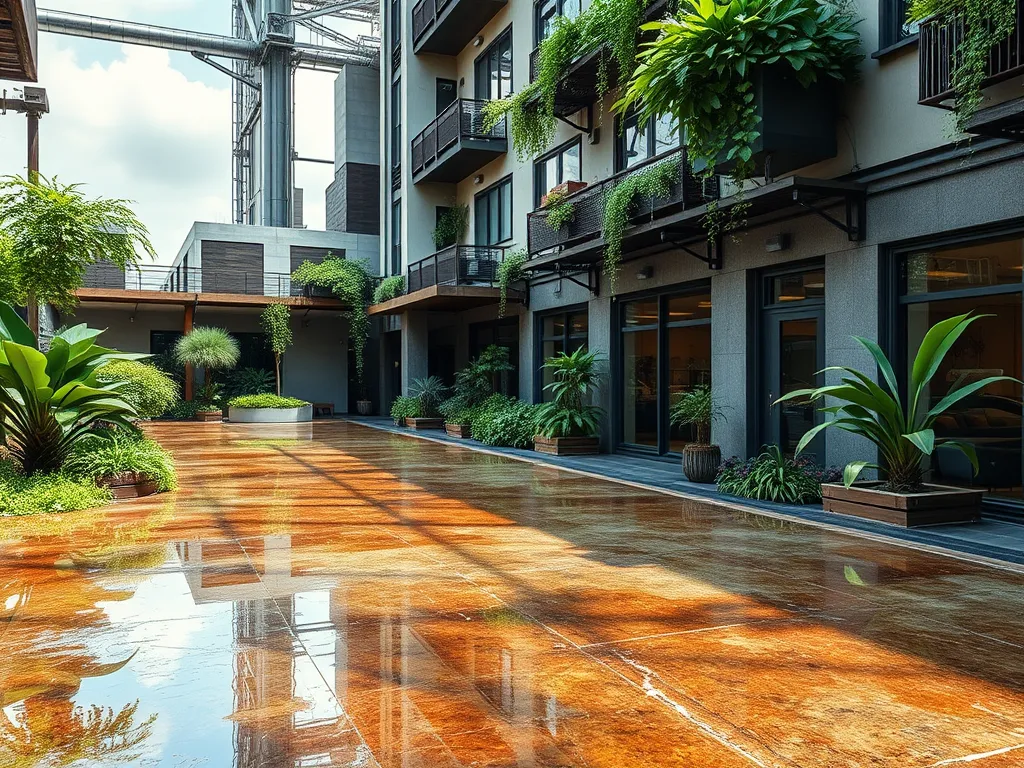
Evaluating Cost-effective Asphalt Alternatives
Businesses exploring asphalt alternatives for commercial use must weigh both upfront expenses and lifetime value. Materials like gravel, concrete, and permeable pavers offer varying price points and performance traits. Let’s break down the numbers.
What is Cheaper Than Asphalt?
Initial costs for common commercial asphalt alternatives vary widely. Gravel and recycled asphalt typically rank as budget-friendly, while resin-bound surfaces or permeable pavers demand higher investments. Choices depend on traffic needs, climate, and local regulations.
Gravel vs. Asphalt Cost Comparison
Gravel averages $1.50 per square foot installed—50% less than asphalt’s $3-$5 range. But frequent regrading (every 1-3 years) adds $0.30-$0.50 per square foot annually. Best for low-traffic zones: overflow parking, storage yards, or access roads. Asphalt lasts 15-20 years with sealcoating; gravel surfaces need replacement every 10-12 years.
Concrete vs. Asphalt Cost Comparison
Concrete costs $6-$10 per square foot—double asphalt’s rate. Yet its 30+ year lifespan with minimal upkeep offsets long-term spend. High-traffic areas like loading docks or warehouse entrances benefit from concrete’s 4,000-5,000 PSI strength. Asphalt requires sealcoating every 3-5 years ($0.15-$0.25 per square foot), while concrete needs only joint resealing ($0.10-$0.20) every decade.
Long-term Savings With Sustainable Alternatives
Eco-friendly asphalt alternatives like permeable pavers or rubberized asphalt cut lifetime costs through durability and lower maintenance. A 2023 National Pavement Association study showed businesses using recycled asphalt saved 20-30% on material costs over 10 years compared to traditional mixes.
Durability and Maintenance Costs
Permeable pavers withstand freeze-thaw cycles better than asphalt, reducing crack repairs. Resin-bound surfaces, though pricier at $8-$12 per square foot, last 25+ years with no potholes. Rubberized asphalt (containing 15-22% recycled tires) needs 40% fewer repairs than standard asphalt, per Federal Highway Administration data.
| Material | Initial Cost (per sq. ft.) | Expected Lifespan | Maintenance Notes |
|---|---|---|---|
| Gravel | $1.50 | 10-15 years | Annual grading, erosion control |
| Asphalt | $3-$5 | 15-20 years | Sealcoating every 3-5 years |
| Recycled Asphalt | $2.50-$4 | 15-20 years | Occasional patching |
Beyond dollars, consider how installation methods impact project timelines and site operations. Up next: strategies for seamless installation and upkeep of these surfaces.
Also See: Essential Driveway Maintenance Tools for Homeowners
Installation and Maintenance Of Asphalt Alternatives
Switching to eco-friendly surfaces for businesses requires proper setup and care. Each material demands specific steps during installation. Long-term performance depends on following upkeep guidelines tailored to the surface type.
Preparing for Installation
Site prep varies based on the chosen material. For permeable pavers, contractors test soil stability and plan drainage systems. Geotextile fabric—a permeable membrane stabilizing soil—is often laid before adding crushed stone bases. Recycled rubberized surfaces need subgrade compaction to prevent shifting. Concrete slabs require formwork setup with expansion joints to handle temperature changes. Budget 3-5 days for most commercial projects, factoring in curing times for bonded materials.
Routine Maintenance Requirements
Permeable pavers need yearly joint cleaning with specialized sweepers to maintain water flow. Pressure wash resin-bound surfaces every 6 months to prevent staining. Gravel lots require regrading every 24-36 months to fix ruts. Recycled asphalt millings benefit from sealcoating every 5-7 years to bind loose particles. Expect to spend $0.10-$0.30 per square foot yearly on upkeep for most sustainable surfaces. Proactive care extends lifespans by 30-50% compared to neglected systems.
Properly installed eco-friendly pavements for business sites boost durability while cutting long-term expenses. Beyond functionality, these surfaces offer design flexibility that elevates property aesthetics.
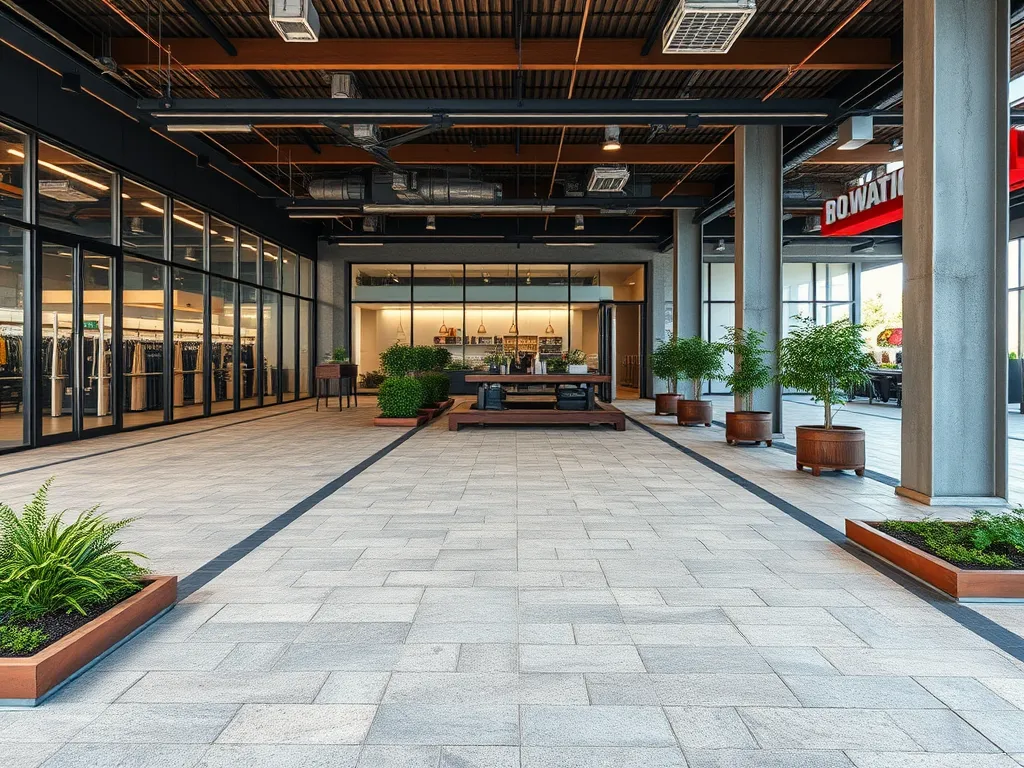
Aesthetic Enhancements With Asphalt Alternatives
Businesses no longer need to sacrifice style for durability. Modern asphalt alternatives merge visual appeal with functional performance, offering commercial properties fresh ways to stand out.
Design Flexibility for Business Properties
Alternatives like resin-bound surfaces or stamped concrete unlock creative freedom. Stamped concrete mimics natural stone or brick at $8–$15 per sq. ft., while permeable pavers come in geometric designs for parking lots or walkways. Recycled rubber tiles, priced at $4–$8 per sq. ft., allow custom logos or color-blocked patterns. These materials adapt to slopes, curves, and high-traffic zones without cracking—ideal for hotel entrances, retail plazas, or corporate campuses.
Improving Curb Appeal With Eco-friendly Surfaces
Eco-friendly surfaces for businesses boost aesthetics while aligning with sustainability goals. Permeable pavers reduce stormwater runoff by 50–70% and come in earthy tones that blend with landscaping. Resin-bound gravel, made with 30–50% recycled glass or stone, provides a polished look for patios or driveways. Green paving grids filled with grass or low-growing plants cut urban heat by 7–15°F, enhancing storefronts or office complexes. LEED-certified projects often use these materials to earn credits for stormwater management and recycled content.
Up next: How these surfaces also tackle environmental challenges like heat reduction and water drainage.
Environmental Benefits Of Sustainable Asphalt Alternatives
Switching from traditional paving brings significant sustainability gains. Options like porous pavers or rubberized materials tackle two critical urban challenges: rising temperatures and stormwater overload.
Reducing Urban Heat Islands
Dark asphalt absorbs up to 95% of solar radiation, boosting surface temps by 40-60°F. Light-toned materials like concrete with high SRI (Solar Reflectance Index) scores above 29 reflect sunlight, cutting thermal absorption. Resin-bound pavements mixed with quartz or limestone can lower ambient air temps by 7°F in parking lots. This reduces HVAC loads in adjacent buildings by 15%, saving $0.10-$0.30 per square foot annually.
Stormwater Management and Permeability
Permeable options allow 3-8 gallons of water per minute per square foot to infiltrate soil. Gravel driveways cost $1.50-$3.00 per square foot and cut runoff by 70% versus asphalt. Porous concrete used in loading zones meets EPA stormwater guidelines, avoiding $4,000-$10,000 in retention pond costs for a 20,000 sq ft lot. Some cities offer 10-25% tax credits for installing LID (Low-Impact Development) surfaces.
Businesses weighing these options often ask how installation timelines and local codes affect project viability.
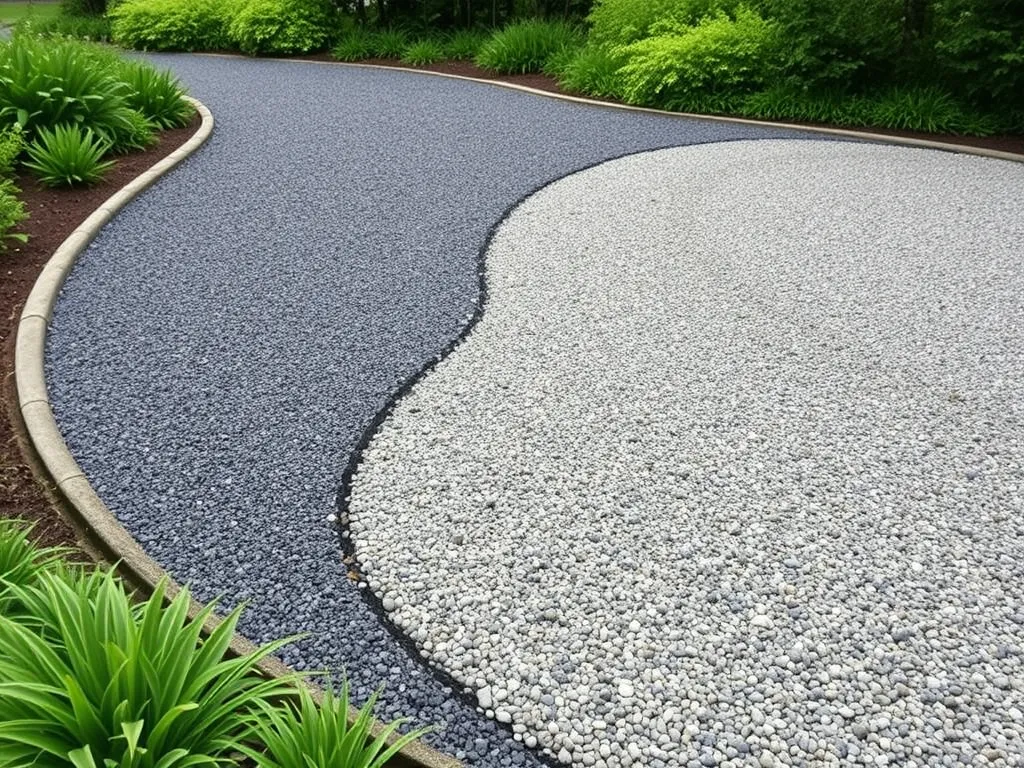
Frequently Asked Questions About Asphalt Alternatives
Is There a Better Alternative to Asphalt?
Yes, there are several asphalt alternatives that can be better suited for specific applications. Options like permeable pavers, concrete, and gravel offer unique advantages, including improved water drainage, durability, and lower environmental impact. The best choice will depend on the specific needs of your business, such as budget, traffic considerations, and aesthetic preferences.
What Are the Cheaper Alternatives to an Asphalt Driveway?
Cheaper alternatives to an asphalt driveway include gravel and recycled asphalt, which can cost significantly less than traditional asphalt. Gravel typically ranges from $1.50 to $3.00 per square foot, while recycled asphalt costs about $2.50 to $4.00 per square foot. These options provide effective surfaces for lower traffic areas and can help reduce initial installation costs.
What Are the Green Alternatives to Asphalt Roads?
Green alternatives to asphalt roads include permeable pavers, recycled asphalt, and resin-bound surfaces. These materials not only reduce environmental impact but also enhance stormwater management and allow for better drainage, reducing the risk of urban runoff and improving local water quality.
Can I Replace My Asphalt Driveway With Gravel or Permeable Pavers?
Yes, you can replace your asphalt driveway with either gravel or permeable pavers. Gravel is an excellent option for low-traffic areas, while permeable pavers are ideal for places where water management is a priority, as they allow for effective drainage and reduce runoff. Be sure to assess site conditions and local regulations before making a change.
How Do Asphalt Alternatives Compare in Terms Of Longevity?
Asphalt alternatives typically offer varying lifespans. For example, concrete surfaces can last 30-40 years with proper maintenance, while permeable pavers may last 25 years or more. Gravel requires more frequent replacement, often needing attention every 10-15 years. The longevity of each type also depends on factors such as usage, climate, and maintenance practices.
Are There Specific Installation Requirements for Asphalt Alternatives?
Yes, each asphalt alternative has specific installation requirements. For instance, permeable pavers require proper soil testing and drainage planning, whereas gravel needs adequate layering and compaction. It’s essential to understand the installation procedures for each material to ensure durability and performance in the long run.
What Maintenance is Required for Eco-friendly Asphalt Alternatives?
Maintenance requirements vary by material. Gravel typically needs regrading every few years, while permeable pavers require periodic cleaning of joints and surfaces to maintain permeability. Resin-bound surfaces may need occasional pressure washing to prevent staining, while concrete primarily requires joint sealing every decade. Regular maintenance can enhance the lifespan of these surfaces significantly.
Closing Thoughts
Exploring asphalt alternatives presents businesses with sustainable, cost-effective options. From concrete surfaces to permeable pavers and recycled materials, each alternative has unique advantages and considerations. Understanding these options can lead to better decision-making, aligning both financial and environmental goals.
Evaluating factors such as installation costs, long-term savings, and aesthetic choices is critical. The right choice not only enhances your property’s value but also supports eco-friendly practices. This shift contributes to managing urban heat and improving stormwater systems, benefiting the community as a whole.
For more insights on asphalt alternatives and related information, visit Asphalt Calculator USA. Your journey to sustainable paving starts here.
Additional Resources for You:
- The Asphalt Institute. (2007). MS-4: The Asphalt Handbook. Lexington, KY: Asphalt Institute.
- r/solarpunk on Reddit: Alternatives to Asphalt and Rubber in Transportation
- Commercial Asphalt: 7 Uses for Asphalt at Your Business | NK
- Paving the Way: Innovative Alternatives to Traditional Pavement Materials – Rubcorp
- Upgrade Your Driveway: Asphalt and 5 Alternatives Compared

